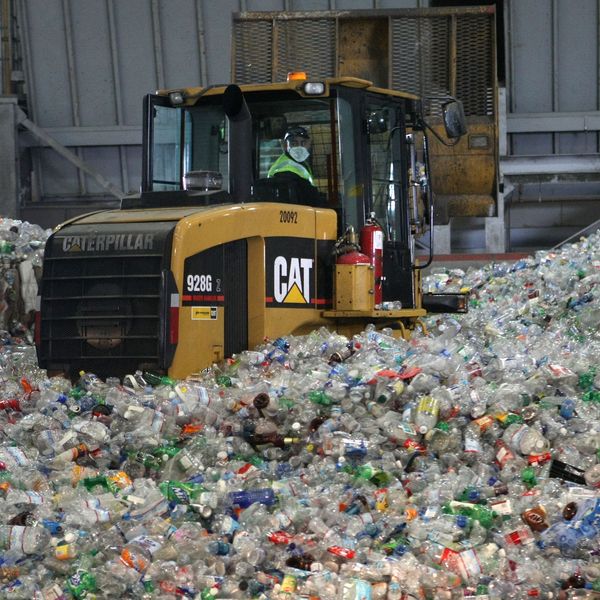
In healthcare and other societal costs, the use of per- and polyfluorinated substances costs more than $17 trillion per year.
Societal Cost of 'Forever Chemicals' Estimated at Over $17,000,000,000,000
"Why are we allowing this?" asked one group. "$17.5 TRILLION in societal cost so that industry can make billions."
An upcoming report by Sweden-based organization ChemSec will detail the costs of the continued use of so-called "forever chemicals" which go overlooked by their manufacturers—the "societal" price that individuals and governments pay as the chemicals remain in the environment long after they are used in a range of products.
Factoring in soil and water remediation, monitoring of pollution, and healthcare costs associated with a number of health problems linked to per- and polyfluorinated substances (PFAS), the cost to society of using the chemicals totals about $17.5 trillion every year.
ChemSec has worked with investment firms to pressure companies to eliminate the use of PFAS, which have earned the nickname "forever chemicals" because they do not naturally degrade and have been detected in breastmilk, wildlife, and drinking water samples.
Major manufacturers of PFAS include Chemours, Solvay, Daiki, Honeywell, Bayer, and 3M—the last of which announced this year it will discontinue the use of the synthetic compounds.
While manufacturers typically prioritize their profit margins and shareholder rewards over public health and safety, ChemSec found that these companies bring in relatively little money each year from using PFAS, compared to their cost to society.
The use of forever chemicals yields only about $4 billion each year, according to The Guardian, which reported on ChemSec's findings ahead of the release of the analysis.
"If you compare the profits that they make and the cost to society—it's ridiculous," Peter Pierrou, communications director for ChemSec, told The Guardian.
When accounting for the societal cost of using PFAS to make a range of products heat-, water-, and stain-resistant, the price of the chemicals is more than $20,400 per kilogram rather than the recognized average market price of about $20.75.
"Why are we allowing this? $17.5 TRILLION [in] societal cost so that industry can make billions," said the Environmental Media Association in response to the findings, which will be released with more detail in "a couple of weeks," according to ChemSec.
\u201cWhy are we allowing this? $17.5 TRILLION societal cost so that industry can make billions. It's ludicrous. \n\nSocietal cost of \u2018forever chemicals\u2019 about $17.5tn across global economy \u2013 report https://t.co/S3mimg394h #health #pollution #ClimateStrike\u201d— Enviro. Media Assoc. (@Enviro. Media Assoc.) 1683894925
Health-related social costs of PFAS include treatment for cancers, thyroid disease, kidney dysfunction, birth defects, and autoimmune diseases, all of which have been linked to low levels of exposure.
The drinking water of at least 200 million Americans is believed to be contaminated with forever chemicals, and the compounds have become ubiquitous throughout Europe as well.
ChemSec's analysis will also examine the use of PFAS in "essential" versus "non-essential cases." The European Union in February proposed a ban on the chemicals in products for which manufacturers have identified alternative, non-toxic substitutes that can also repel water, heat, and stains.
The organization has made some progress in appealing to manufacturers to end their use of PFAS by pointing to the chemicals' cost to society. Late last year it organized a letter signed by investment firms which hold $11 trillion in assets in the E.U. warning that companies risk threatening "public health, the environment, and shareholder value" if they continue to use forever chemicals.
"There is particular concern about PFAS, often found in cosmetics, furniture, carpeting, non-stick pans, and waterproof jackets, which accumulate in the environment and cause health impacts for generations," the investment firms warned. "Growing awareness of these risks has triggered a surge in lawsuits, which could cost chemicals companies as much as $30 billion."
An Urgent Message From Our Co-Founder
Dear Common Dreams reader, The U.S. is on a fast track to authoritarianism like nothing I've ever seen. Meanwhile, corporate news outlets are utterly capitulating to Trump, twisting their coverage to avoid drawing his ire while lining up to stuff cash in his pockets. That's why I believe that Common Dreams is doing the best and most consequential reporting that we've ever done. Our small but mighty team is a progressive reporting powerhouse, covering the news every day that the corporate media never will. Our mission has always been simple: To inform. To inspire. And to ignite change for the common good. Now here's the key piece that I want all our readers to understand: None of this would be possible without your financial support. That's not just some fundraising cliche. It's the absolute and literal truth. We don't accept corporate advertising and never will. We don't have a paywall because we don't think people should be blocked from critical news based on their ability to pay. Everything we do is funded by the donations of readers like you. Will you donate now to help power the nonprofit, independent reporting of Common Dreams? Thank you for being a vital member of our community. Together, we can keep independent journalism alive when it’s needed most. - Craig Brown, Co-founder |
An upcoming report by Sweden-based organization ChemSec will detail the costs of the continued use of so-called "forever chemicals" which go overlooked by their manufacturers—the "societal" price that individuals and governments pay as the chemicals remain in the environment long after they are used in a range of products.
Factoring in soil and water remediation, monitoring of pollution, and healthcare costs associated with a number of health problems linked to per- and polyfluorinated substances (PFAS), the cost to society of using the chemicals totals about $17.5 trillion every year.
ChemSec has worked with investment firms to pressure companies to eliminate the use of PFAS, which have earned the nickname "forever chemicals" because they do not naturally degrade and have been detected in breastmilk, wildlife, and drinking water samples.
Major manufacturers of PFAS include Chemours, Solvay, Daiki, Honeywell, Bayer, and 3M—the last of which announced this year it will discontinue the use of the synthetic compounds.
While manufacturers typically prioritize their profit margins and shareholder rewards over public health and safety, ChemSec found that these companies bring in relatively little money each year from using PFAS, compared to their cost to society.
The use of forever chemicals yields only about $4 billion each year, according to The Guardian, which reported on ChemSec's findings ahead of the release of the analysis.
"If you compare the profits that they make and the cost to society—it's ridiculous," Peter Pierrou, communications director for ChemSec, told The Guardian.
When accounting for the societal cost of using PFAS to make a range of products heat-, water-, and stain-resistant, the price of the chemicals is more than $20,400 per kilogram rather than the recognized average market price of about $20.75.
"Why are we allowing this? $17.5 TRILLION [in] societal cost so that industry can make billions," said the Environmental Media Association in response to the findings, which will be released with more detail in "a couple of weeks," according to ChemSec.
\u201cWhy are we allowing this? $17.5 TRILLION societal cost so that industry can make billions. It's ludicrous. \n\nSocietal cost of \u2018forever chemicals\u2019 about $17.5tn across global economy \u2013 report https://t.co/S3mimg394h #health #pollution #ClimateStrike\u201d— Enviro. Media Assoc. (@Enviro. Media Assoc.) 1683894925
Health-related social costs of PFAS include treatment for cancers, thyroid disease, kidney dysfunction, birth defects, and autoimmune diseases, all of which have been linked to low levels of exposure.
The drinking water of at least 200 million Americans is believed to be contaminated with forever chemicals, and the compounds have become ubiquitous throughout Europe as well.
ChemSec's analysis will also examine the use of PFAS in "essential" versus "non-essential cases." The European Union in February proposed a ban on the chemicals in products for which manufacturers have identified alternative, non-toxic substitutes that can also repel water, heat, and stains.
The organization has made some progress in appealing to manufacturers to end their use of PFAS by pointing to the chemicals' cost to society. Late last year it organized a letter signed by investment firms which hold $11 trillion in assets in the E.U. warning that companies risk threatening "public health, the environment, and shareholder value" if they continue to use forever chemicals.
"There is particular concern about PFAS, often found in cosmetics, furniture, carpeting, non-stick pans, and waterproof jackets, which accumulate in the environment and cause health impacts for generations," the investment firms warned. "Growing awareness of these risks has triggered a surge in lawsuits, which could cost chemicals companies as much as $30 billion."
- Opinion | Chemical Companies Are Spending Millions to Lobby Lawmakers on Toxic Forever Chemicals | Common Dreams ›
- Opinion | The Companies Who Brought You Forever Chemicals Now Want to Sell You on Hydrogen | Common Dreams ›
- Industry Braces for PFAS Lawsuits That Could 'Dwarf' Those of Asbestos, Tobacco | Common Dreams ›
An upcoming report by Sweden-based organization ChemSec will detail the costs of the continued use of so-called "forever chemicals" which go overlooked by their manufacturers—the "societal" price that individuals and governments pay as the chemicals remain in the environment long after they are used in a range of products.
Factoring in soil and water remediation, monitoring of pollution, and healthcare costs associated with a number of health problems linked to per- and polyfluorinated substances (PFAS), the cost to society of using the chemicals totals about $17.5 trillion every year.
ChemSec has worked with investment firms to pressure companies to eliminate the use of PFAS, which have earned the nickname "forever chemicals" because they do not naturally degrade and have been detected in breastmilk, wildlife, and drinking water samples.
Major manufacturers of PFAS include Chemours, Solvay, Daiki, Honeywell, Bayer, and 3M—the last of which announced this year it will discontinue the use of the synthetic compounds.
While manufacturers typically prioritize their profit margins and shareholder rewards over public health and safety, ChemSec found that these companies bring in relatively little money each year from using PFAS, compared to their cost to society.
The use of forever chemicals yields only about $4 billion each year, according to The Guardian, which reported on ChemSec's findings ahead of the release of the analysis.
"If you compare the profits that they make and the cost to society—it's ridiculous," Peter Pierrou, communications director for ChemSec, told The Guardian.
When accounting for the societal cost of using PFAS to make a range of products heat-, water-, and stain-resistant, the price of the chemicals is more than $20,400 per kilogram rather than the recognized average market price of about $20.75.
"Why are we allowing this? $17.5 TRILLION [in] societal cost so that industry can make billions," said the Environmental Media Association in response to the findings, which will be released with more detail in "a couple of weeks," according to ChemSec.
\u201cWhy are we allowing this? $17.5 TRILLION societal cost so that industry can make billions. It's ludicrous. \n\nSocietal cost of \u2018forever chemicals\u2019 about $17.5tn across global economy \u2013 report https://t.co/S3mimg394h #health #pollution #ClimateStrike\u201d— Enviro. Media Assoc. (@Enviro. Media Assoc.) 1683894925
Health-related social costs of PFAS include treatment for cancers, thyroid disease, kidney dysfunction, birth defects, and autoimmune diseases, all of which have been linked to low levels of exposure.
The drinking water of at least 200 million Americans is believed to be contaminated with forever chemicals, and the compounds have become ubiquitous throughout Europe as well.
ChemSec's analysis will also examine the use of PFAS in "essential" versus "non-essential cases." The European Union in February proposed a ban on the chemicals in products for which manufacturers have identified alternative, non-toxic substitutes that can also repel water, heat, and stains.
The organization has made some progress in appealing to manufacturers to end their use of PFAS by pointing to the chemicals' cost to society. Late last year it organized a letter signed by investment firms which hold $11 trillion in assets in the E.U. warning that companies risk threatening "public health, the environment, and shareholder value" if they continue to use forever chemicals.
"There is particular concern about PFAS, often found in cosmetics, furniture, carpeting, non-stick pans, and waterproof jackets, which accumulate in the environment and cause health impacts for generations," the investment firms warned. "Growing awareness of these risks has triggered a surge in lawsuits, which could cost chemicals companies as much as $30 billion."
- Opinion | Chemical Companies Are Spending Millions to Lobby Lawmakers on Toxic Forever Chemicals | Common Dreams ›
- Opinion | The Companies Who Brought You Forever Chemicals Now Want to Sell You on Hydrogen | Common Dreams ›
- Industry Braces for PFAS Lawsuits That Could 'Dwarf' Those of Asbestos, Tobacco | Common Dreams ›

